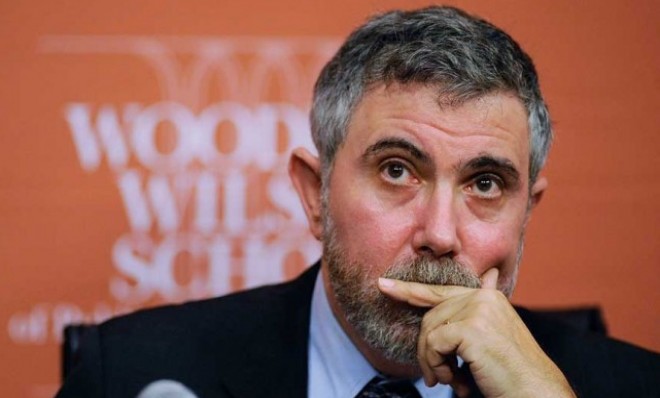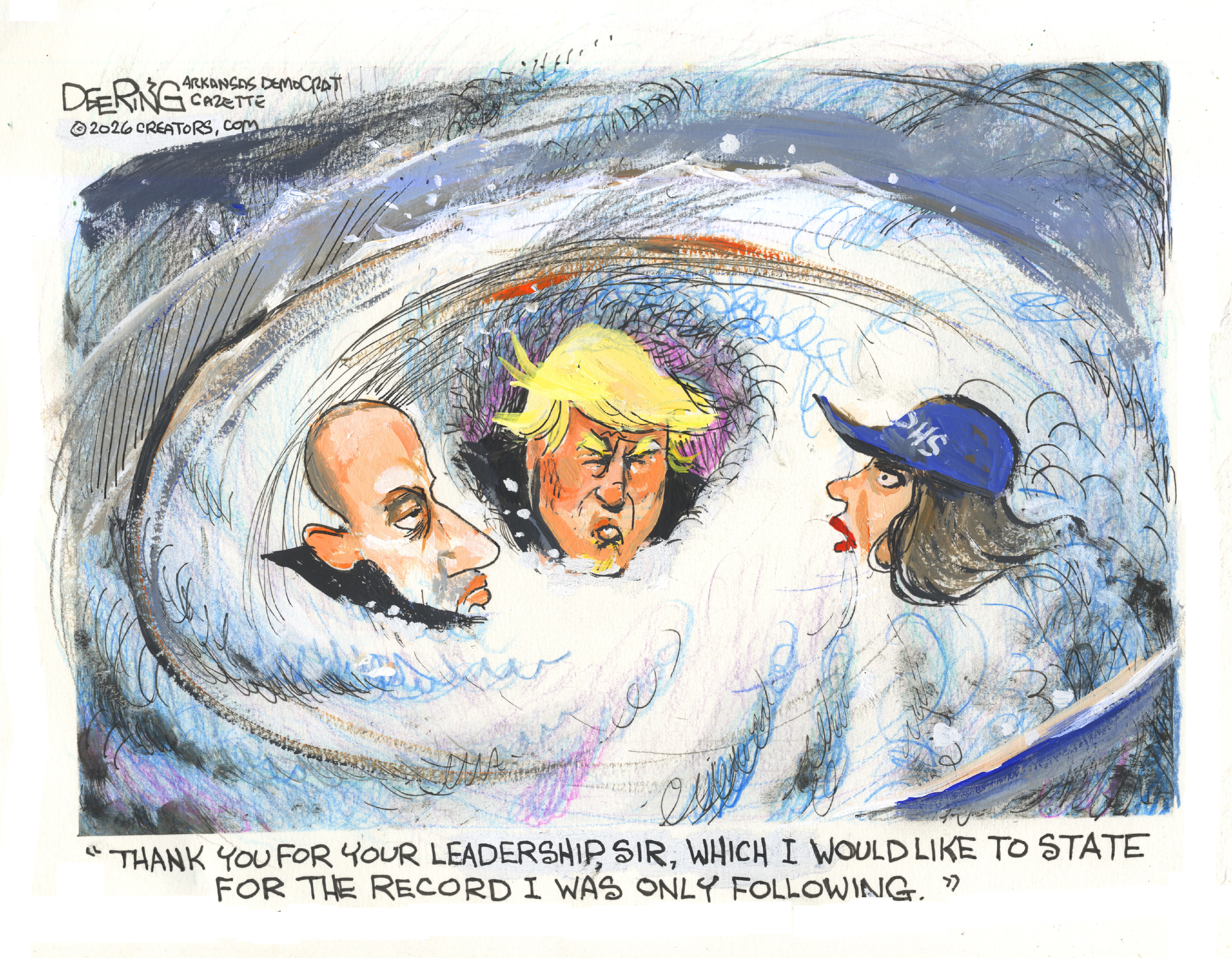The worrying rise of reckless liberal pundits
Sure, many conservatives are engaging in juvenile brinksmanship. But Paul Krugman and Co. are succumbing to shockingly magical thinking


A free daily email with the biggest news stories of the day – and the best features from TheWeek.com
You are now subscribed
Your newsletter sign-up was successful
The White House likes to portray the president as the adult in the room — especially when the room is being used to negotiate with House Republicans over the federal budget. The good news for Obama and the Democrats is that the GOP, repeatedly driven toward reckless brinksmanship by the ideological fervor of the party's base, appears determined to confirm the impression. But that doesn't mean that progressives have earned the right to boast of their own fiscal sobriety and good sense. On the contrary, leading liberals have recently begun to defend positions that seem designed to prove that Democrats can be even more fiscally irresponsible than their Republican counterparts.
Consider the case of Paul Krugman — arguably the country's most influential liberal pundit. In several New York Times columns over the past few years, and most recently this past Monday, Krugman has mocked the "Very Serious People" in Washington who express concern about the enormous deficits (in the range of $1 trillion a year) the federal government is currently running. Yes, the nation faces long-term budget challenges, Krugman concedes, but with interest rates at or near historic lows and unemployment still high, policymakers should ignore the fiscal Chicken Littles and keep right on spending.
To the extent that Krugman's denunciation of centrist deficit hawks is motivated by irritation at their tendency to blame both parties equally for our budget shortfalls, I see his point. Had George W. Bush not combined two massive tax cuts with a major new entitlement (Medicare Part D) and a sharp rise in defense spending, thereby generating large deficits during a time of economic growth, President Obama could have responded aggressively to the deep recession that greeted him upon taking office without throwing the budget quite so far into the red. The right might generate a lot of noise about the dangers of debt, but it's the Republican addiction to tax cuts regardless of the fiscal consequences that deserves the lion's share of the blame for our current budgetary bind.
The Week
Escape your echo chamber. Get the facts behind the news, plus analysis from multiple perspectives.

Sign up for The Week's Free Newsletters
From our morning news briefing to a weekly Good News Newsletter, get the best of The Week delivered directly to your inbox.
From our morning news briefing to a weekly Good News Newsletter, get the best of The Week delivered directly to your inbox.
Yet it is also true that the Bush tax cuts merely brought our deeper, longer-term fiscal problems to light a little sooner than economists once predicted. Social Security and especially Medicare were always going to explode the deficit down the road. And that is a problem for which liberals are at least as responsible as Republicans.
Everyone who looks at the issue honestly admits that addressing this deeper problem will require significant tax hikes as well as deep spending cuts. Yet Krugman continually tells his fellow liberals (and the president, whom he undoubtedly hopes is listening) that there's no need at all to cut spending seriously. Quite the opposite. With governments currently able to finance debt at low and even negative interest rates — a development that amounts to them being offered "free money for the next 10 years" — we have no reason not to increase spending still further.
Krugman is not the only liberal to stake out such a fanciful position. Slate economics blogger Matthew Yglesias has even gone so far as to make the outlandish suggestion that the government stop collecting taxes altogether and finance its spending entirely through debt. Reading Krugman and Yglesias on the topic, you'd never guess that the principal on a loan (even one taken at zero or negative interest) eventually has to be repaid.
They must know this, right? Given that both authors recently endorsed the manifestly absurd idea that the president could pay down a chunk of the nation's debt by instructing the Treasury Department to mint a trillion-dollar platinum coin, I'm not so sure. The suggestion is so ludicrous, it's astonishing anyone — let alone two leading liberal pundits, one of whom is a Nobel laureate in economics — would advocate it. Yet advocate it they did.
A free daily email with the biggest news stories of the day – and the best features from TheWeek.com
Was it just a tactical bluff meant to show Republicans how far Democrats would be willing to go to deprive their opponents of yet another opportunity to extract concessions under threat of national default? Probably. But if it was just a gimmick, it was a singularly unfortunate one — and not just because no one in his right mind could take it seriously. The platinum coin gambit was a mistake above all because, like proposals to increase spending in the face of trillion-dollar deficits, it confirms the most potent conservative critique of liberalism: That on fiscal matters, it's prone to magical thinking.
With the GOP and the conservative movement increasingly inclined to prefer foot-stomping to governing, it's all the more important to the civic and fiscal health of the nation that liberals think and act responsibly. Entitlements will need to be means-tested and spending slashed — for the seemingly obvious reason that revenue cannot be conjured out of thin air. That's reality in early 21st-century America. Liberals need to face it like grown-ups — and stop giving the president advice straight out of fairy tales.
Damon Linker is a senior writing fellow at the University of Pennsylvania, a contributing editor at The New Republic, and the author of The Theocons and The Religious Test. You can follow him on Twitter: @DamonLinker.
Damon Linker is a senior correspondent at TheWeek.com. He is also a former contributing editor at The New Republic and the author of The Theocons and The Religious Test.
-
 Russia’s ‘cyborg’ spy pigeons
Russia’s ‘cyborg’ spy pigeonsUnder the Radar Moscow neurotech company with Kremlin-linked funding claims to implant neural chips in birds’ brains to control their flight, and create ‘bio-drones’
-
 Political cartoons for February 8
Political cartoons for February 8Cartoons Sunday’s political cartoons include going down the drain, American history, and more
-
 Touring the vineyards of southern Bolivia
Touring the vineyards of southern BoliviaThe Week Recommends Strongly reminiscent of Andalusia, these vineyards cut deep into the country’s southwest
-
 The billionaires’ wealth tax: a catastrophe for California?
The billionaires’ wealth tax: a catastrophe for California?Talking Point Peter Thiel and Larry Page preparing to change state residency
-
 Bari Weiss’ ‘60 Minutes’ scandal is about more than one report
Bari Weiss’ ‘60 Minutes’ scandal is about more than one reportIN THE SPOTLIGHT By blocking an approved segment on a controversial prison holding US deportees in El Salvador, the editor-in-chief of CBS News has become the main story
-
 Has Zohran Mamdani shown the Democrats how to win again?
Has Zohran Mamdani shown the Democrats how to win again?Today’s Big Question New York City mayoral election touted as victory for left-wing populists but moderate centrist wins elsewhere present more complex path for Democratic Party
-
 Millions turn out for anti-Trump ‘No Kings’ rallies
Millions turn out for anti-Trump ‘No Kings’ ralliesSpeed Read An estimated 7 million people participated, 2 million more than at the first ‘No Kings’ protest in June
-
 Ghislaine Maxwell: angling for a Trump pardon
Ghislaine Maxwell: angling for a Trump pardonTalking Point Convicted sex trafficker's testimony could shed new light on president's links to Jeffrey Epstein
-
 The last words and final moments of 40 presidents
The last words and final moments of 40 presidentsThe Explainer Some are eloquent quotes worthy of the holders of the highest office in the nation, and others... aren't
-
 The JFK files: the truth at last?
The JFK files: the truth at last?In The Spotlight More than 64,000 previously classified documents relating the 1963 assassination of John F. Kennedy have been released by the Trump administration
-
 'Seriously, not literally': how should the world take Donald Trump?
'Seriously, not literally': how should the world take Donald Trump?Today's big question White House rhetoric and reality look likely to become increasingly blurred
